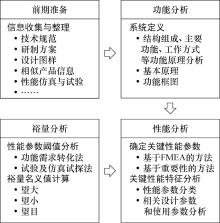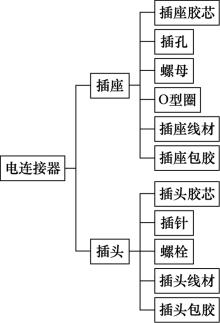| 1 |
杨为民. 可靠性维修性保障性导论[M]. 北京: 国防工业出版社, 1995.
|
|
YANG W M . Introduction to reliability, maintainability and supportability[M]. Beijing: National Defense Industry Press, 1995.
|
| 2 |
MEEKER W Q , ESCOBAR L . Statistical methods for reliability data[M]. New York: John Wiley & Sons, 1998.
|
| 3 |
PECHT M , DASGUPTA A , BARKER D , et al. The reliability physics approach to failure prediction modelling[J]. Quality & Reliability Engineering International, 2010, 6 (4): 267- 273.
|
| 4 |
KANG R , ZHANG Q Y , ZENG Z G , et al. Measuring reliability under epistemic uncertainty: review on non-probabilistic reliability metrics[J]. Chinese Journal of Aeronautics, 2016, 29 (3): 571- 579.
doi: 10.1016/j.cja.2016.04.004
|
| 5 |
康锐. 确信可靠性理论与方法[M]. 北京: 国防工业出版社, 2020.
|
|
KANG R . Belief reliability theory and methodology[M]. Beijing: National Defense Industry Press, 2020.
|
| 6 |
ZENG Z G , WEN M L , KANG R . Belief reliability: a new metric for products' reliability[J]. Fuzzy Optimization and Decision Making, 2013, 12, 15- 27.
doi: 10.1007/s10700-012-9138-5
|
| 7 |
ZENG Z G , KANG R , WEN M L , et al. A model-based reliability metric considering aleatory and epistemic uncertainty[J]. IEEE Access, 2017, 5, 15505- 15515.
doi: 10.1109/ACCESS.2017.2733839
|
| 8 |
范梦飞, 曾志国, 康锐. 基于确信可靠度的可靠性评价方法[J]. 系统工程与电子技术, 2015, 37 (11): 2648- 2653.
doi: 10.3969/j.issn.1001-506X.2015.11.34
|
|
FAN M F , ZENG Z G , KANG R . An approach to measure reliability based on belief reliability[J]. Systems Engineering and Electronics, 2015, 37 (11): 2648- 2653.
doi: 10.3969/j.issn.1001-506X.2015.11.34
|
| 9 |
ZHANG Q Y , KANG R , WEN M L . Belief reliability for uncertain random systems[J]. IEEE Trans.on Fuzzy Systems, 2018, 26 (6): 3605- 3614.
doi: 10.1109/TFUZZ.2018.2838560
|
| 10 |
LIU B D . Uncertainty Theory[M]. 2nd ed Berlin: Springer, 2007.
|
| 11 |
LIU Y H . Uncertain random variables: a mixture of uncertainty and randomness[J]. Soft Computing, 2013, 17 (4): 625- 634.
doi: 10.1007/s00500-012-0935-0
|
| 12 |
ZENG Z G , KANG R , WEN M L , et al. Uncertainty theory as a basis for belief reliability[J]. Information Sciences, 2018, 49, 26- 36.
|
| 13 |
ZU T P , KANG R , WEN M L , et al. Belief reliability distribution based on maximum entropy principle[J]. IEEE Access, 2017, 6, 1577- 1582.
|
| 14 |
GAO R , YAO K . Importance index of components in uncertain reliability systems[J]. Journal of Uncertainty Analysis and Applications, 2016, 4, 1- 19.
doi: 10.1186/s40467-015-0043-7
|
| 15 |
ZHANG Q Y, WEN M L, KANG R, et al. A performance-margin-based belief reliability model considering parameter uncertainty[C]//Proc. of the 28th European Safety and Reliability Conference, 2018.
|
| 16 |
于格, 康锐, 林焱辉, 等. 基于确信可靠度的齿轮可靠性建模与分析[J]. 系统工程与电子技术, 2019, 41 (10): 2385- 2391.
doi: 10.3969/j.issn.1001-506X.2019.10.31
|
|
YU G , KANG R , LIN Y H , et al. Reliability modeling and analysis of gear based on belief reliability[J]. Systems Engineering and Electronics, 2019, 41 (10): 2385- 2391.
doi: 10.3969/j.issn.1001-506X.2019.10.31
|
| 17 |
LI X Y , WU J P , LIU L , et al. Modeling accelerated degradation data based on the uncertain process[J]. IEEE Trans.on Fuzzy Systems, 2019, 27 (8): 1532- 1542.
doi: 10.1109/TFUZZ.2018.2883016
|
| 18 |
BARKER R , LONGMAN C . Case method: function and process modeling[M]. London: Addison-Wesley, 1992.
|
| 19 |
许国志. 系统科学[M]. 上海: 上海科技教育出版社, 2001.
|
|
XU G Z . Systems science[M]. Shanghai: Shanghai Scientific and Technological Education Publishing House, 2001.
|
| 20 |
GJBZ 1391-2006. 故障模式、影响及危害性分析指南[S]. 北京: 中国人民解放军总装备部, 2006.
|
| 26 |
GJBZ 1391-2006. Guide to failure mode, effects and criticality analysis[S]. Beijing: General Equipment Department of the Chinese People's Liberation Army, 2006.
|
 ), Meilin WEN2(
), Meilin WEN2( ), Rui KANG2,*(
), Rui KANG2,*( ), Boyuan LI2(
), Boyuan LI2( ), Li YU2(
), Li YU2( )
)





